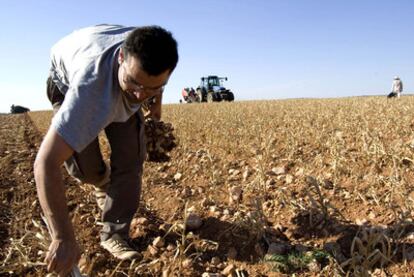Ethical banking takes root in the mire of the global financial crisis
Investors are shunning traditional lenders for ones that deal in real economy
The financial crisis and its excesses have manured a breeding ground where new initiatives are sprouting, aimed at revolutionizing the banking world, or at least at introducing a different outlook, with a certain moral content.
Among these, ethical banking is raising its head, with statistics that show a sustained growth in clientele. The May 15 "indignation" movement has inspired thousands of people to search for alternatives to a traditional banking system that they reject. Ethical banking institutions are attracting more clients than ever, and their growth, though limited, is constant.
The ethical banking sector, composed in Spain of only five entities and somewhere more than 50,000 clients, stands for total transparency. It only invests in the real economy, finances projects related to sectors such as renewable energies and ecological agriculture, and holds social justice to be its own particular Bible.
"I looked at the list of companies I had invested in, and none of them were to my liking. It was a pleasure to tell my bank to withdraw all my investments in the stock market. Then your conscience is a lot clearer, because your money is passing through an ethical filter," says Víctor Maeso, member of an agricultural cooperative at Manresa, near Barcelona.
Triodos Bank accounts for the bulk of ethical banking clients in Spain (45,000) and last year grew by 60 percent. Since May, the entity says it has attracted 9,000 new clients thanks to a media visibility amplified by the May 15 movement.
The bank, which was born in the Netherlands 30 years ago and has some 300,000 clients worldwide, prides itself on the loyalty of its customers and on its wealth of accumulated experience.
"It is not the same thing to invest in renewable energies as in nuclear plants, in ecological agriculture as in transgenics, in fair trade and development cooperation as in businesses that trample on human rights," says Esteban Barroso, general director of Triodos.
"Years ago people tended to equate us with the cajas de ahorro (publicly administered regional savings banks, traditionally sponsors of public-interest and cultural programs), but that has gone down the drain. Now that the cajas have been merged, they are selling themselves with an image of "civic banking," because the client no longer believes that they really benefit society," opines Juan Garibi, of the foundation Fiare, which has 30 million euros in business volume and 1,600 clients.
Fiare has doubled its business volume and tripled its clientele in two years.
The May 15 movement supports ethical banking, but with reservations: "We see it as an alternative to traditional private banking. But it is only an option in the short term. What we want to see is a public banking system, which would also be ethical," says Alberto Garzón, of the scientific council of Attac España, a group that forms part of the May 15 movement.

Tu suscripción se está usando en otro dispositivo
¿Quieres añadir otro usuario a tu suscripción?
Si continúas leyendo en este dispositivo, no se podrá leer en el otro.
FlechaTu suscripción se está usando en otro dispositivo y solo puedes acceder a EL PAÍS desde un dispositivo a la vez.
Si quieres compartir tu cuenta, cambia tu suscripción a la modalidad Premium, así podrás añadir otro usuario. Cada uno accederá con su propia cuenta de email, lo que os permitirá personalizar vuestra experiencia en EL PAÍS.
¿Tienes una suscripción de empresa? Accede aquí para contratar más cuentas.
En el caso de no saber quién está usando tu cuenta, te recomendamos cambiar tu contraseña aquí.
Si decides continuar compartiendo tu cuenta, este mensaje se mostrará en tu dispositivo y en el de la otra persona que está usando tu cuenta de forma indefinida, afectando a tu experiencia de lectura. Puedes consultar aquí los términos y condiciones de la suscripción digital.








































